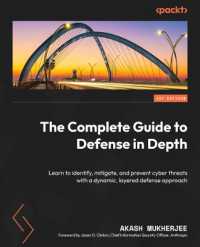Full Description
This book examines education policy making with close reference to interview evidence of protagonists and observers of the period, who include senior officials, ministers and ministerial special advisers. It introduces an original typology of regulars, irregulars and politicos, to classify those involved and examines the personal and political context in which they operated, how these contexts impacted on their decisions, and the subsequent course of education policies. The theme of the book is that people matter. Introducing personality' into our understanding and interpretation of the development of education policy, constitutes a significant original contribution. Too often individual policy-makers have been portrayed as caricature creatures of a 'role', or an 'interest'. The actions, or inter-actions, of individuals are viewed and analysed through the prism of policies or assumed ideological positions. The book explores the reverse relationship, where the course of policies is not studied through abstract generalities' but through the concrete experiences of individuals, the personal and political contingencies they faced. It was not that politics and personality were all that mattered between 1976 and 1997. Rather, the problem was that they mattered too much.
Contents
Introduction; No longer 'positive, helpful, worthy and dull': 1976-1979; At the margins: May 1979-September 1981; Different drummers: September 1981-May 1986; Dash for glory: May 1986-July 1987; Unforeseen ways: July 1987-July 1989; 'The worst job in government: July 1989-November 1990; The 'uncomplicated bloke': November 1990-April 1992; Crisis, disorder, confusion and mismanagement: May 1992-July 1994; Leaden Evening: July 1994-April 1997; Conclusion.








